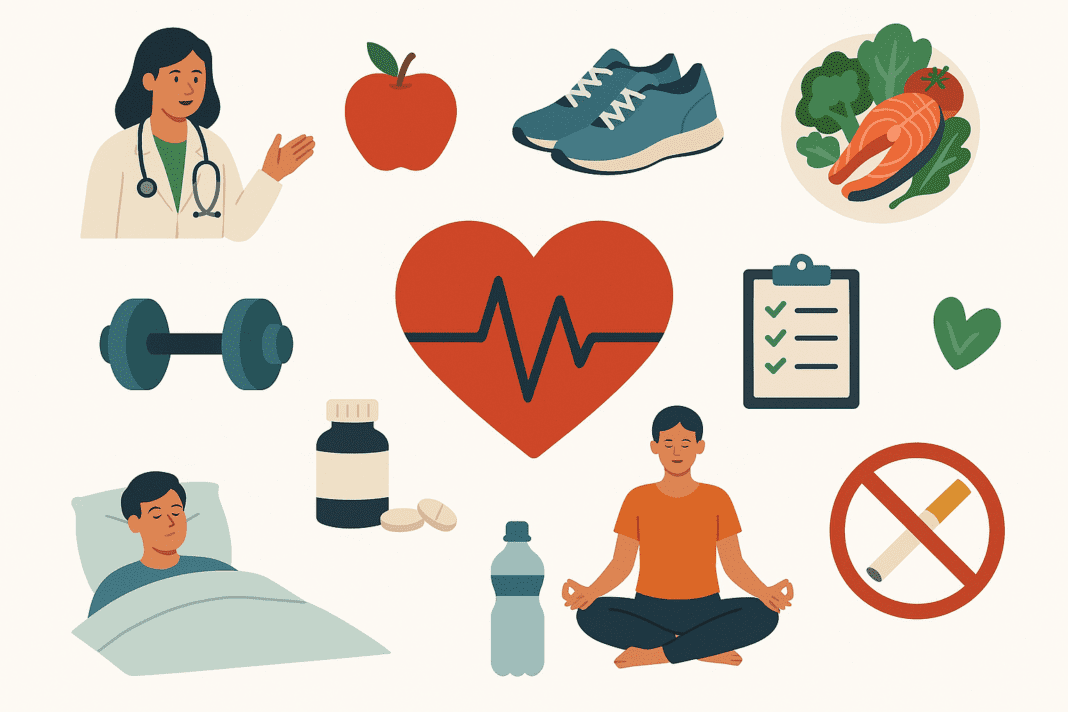Why Strengthening Your Heart Matters More Than Ever
Cardiovascular disease remains the leading cause of death worldwide, making heart health a central concern for anyone looking to lead a long, vibrant life. Learning how to strengthen your heart isn’t simply about preventing illness; it’s about optimizing your entire body’s performance. Your heart fuels every cell, tissue, and organ, so when your cardiovascular health is strong, your whole system functions better. And while genetics and age can play a role in heart disease risk, lifestyle choices are powerful and transformative tools. Whether you’re wondering how to improve cardiovascular health after a diagnosis or you’re just aiming for prevention, science offers clear, effective strategies you can begin using today.
You may also like: 5 Ways to Keep Your Heart Healthy and Prevent Cardiovascular Disease
What’s exciting is that advances in medical research have clarified how regular exercise, balanced nutrition, restorative sleep, and targeted habits can drastically improve heart health quickly and sustainably. From the best exercise for heart health to foods that reduce inflammation and blood pressure, these methods don’t require drastic changes. They ask for consistency, knowledge, and a commitment to taking care of your heart in ways that are both achievable and backed by science.
This comprehensive guide breaks down the top 10 doctor-approved ways to increase cardiovascular health, optimize heart function, and make a weak heart stronger. If you’ve been asking yourself, “What can I do to strengthen my heart?” or “How can you improve your heart health naturally?” — this article is your evidence-based roadmap.
Prioritize Cardiovascular Health Exercise for Lifelong Heart Strength
When it comes to how to take care of your heart, movement is medicine. Cardiovascular health exercise — or aerobic activity — remains the cornerstone of most heart-healthy recommendations. It’s not just about weight control or reducing cholesterol; regular movement has profound effects on the heart muscle itself. Aerobic activities like brisk walking, swimming, cycling, or dancing increase heart rate and enhance circulation, improving the heart’s efficiency in pumping blood throughout the body.
Consistent cardio for heart health leads to lower resting heart rate, improved blood pressure, and better oxygen delivery to tissues. This not only boosts energy and endurance but can also directly reverse some of the early damage caused by sedentary lifestyles. For those looking to improve heart health in 30 days, studies have shown that just 150 minutes of moderate-intensity aerobic activity per week — about 30 minutes five times per week — can yield measurable improvements in cardiovascular markers.
Moreover, cardiovascular health exercise triggers the release of nitric oxide, a molecule that relaxes blood vessels and enhances blood flow. This physiological response reduces arterial stiffness, lowers the risk of blood clots, and promotes better vascular function overall. For those wondering, “How does physical activity prevent heart disease?” — it does so by targeting nearly every known risk factor: obesity, hypertension, high cholesterol, insulin resistance, and systemic inflammation.

Incorporate Strength Training to Improve Heart Function
While cardio often steals the spotlight, resistance training is equally vital when discussing how to improve heart function. Lifting weights, performing bodyweight exercises like squats or pushups, and using resistance bands all contribute to better metabolic and muscular health. These benefits, in turn, reduce the strain on the heart.
Strength training increases lean body mass and improves insulin sensitivity, which are crucial factors in controlling blood sugar and blood pressure. Importantly, resistance exercise also supports vascular health by lowering LDL (bad cholesterol) and raising HDL (good cholesterol). For patients managing heart conditions, well-supervised strength routines offer a way to make a weak heart stronger by improving overall fitness without excessive strain.
Doctors now recommend incorporating resistance training at least two days a week, focusing on major muscle groups. This dual-approach — combining aerobic and resistance training — represents one of the top 5 ways to keep the circulatory system healthy. So if you’re searching for good exercise for heart health, don’t underestimate the power of muscle-building in addition to cardio.
Adopt a Mediterranean-Inspired Diet for Lasting Heart Protection
One of the most studied and doctor-recommended strategies to strengthen the heart is adopting a Mediterranean-style diet. Rich in plant-based foods, healthy fats like olive oil, lean proteins such as fish and legumes, and low in processed sugars and red meats, this approach has been linked to significantly reduced risks of heart attack, stroke, and chronic inflammation.
The high content of omega-3 fatty acids, antioxidants, and fiber in this dietary pattern helps repair damaged heart muscles naturally while improving lipid profiles. Whole grains, nuts, leafy greens, berries, and herbs all play roles in reducing oxidative stress and supporting endothelial function. Those who follow this diet consistently often experience lower blood pressure, reduced triglycerides, and better glycemic control.
For individuals who want to know how to improve heart health quickly, transitioning to a Mediterranean-based eating plan can yield benefits within weeks. Unlike restrictive fad diets, it emphasizes sustainable, flavorful meals that support both cardiovascular and mental well-being. In clinical settings, it remains one of the top lifestyle recommendations for those aiming to increase cardiovascular health through natural, non-pharmaceutical means.
Get Sufficient, Quality Sleep to Support Heart Recovery
Sleep isn’t just rest for the mind — it’s recovery time for the heart. Chronic sleep deprivation is linked to elevated blood pressure, increased sympathetic nervous system activity, and higher levels of stress hormones like cortisol. Over time, these factors contribute to plaque buildup in arteries and reduced heart resilience.
Adults need at least seven to nine hours of high-quality sleep per night to allow for adequate cardiovascular repair and regulation. Sleep is particularly important for heart rate variability and blood pressure regulation, which are predictive of long-term cardiac outcomes. If you’re actively exploring how can you improve your heart health, optimizing your sleep routine should be one of the first adjustments you make.
Sleep apnea, insomnia, and irregular sleep schedules have all been associated with elevated cardiovascular risk. Addressing these issues through behavioral therapy, stress reduction, or medical intervention can significantly strengthen heart function. It’s also during deep sleep that the body regulates inflammation and repairs blood vessels, both of which are vital in maintaining a healthy heart.
Manage Stress Through Mindfulness and Relaxation Techniques
Psychological stress is a silent saboteur of cardiovascular health. It contributes to chronic inflammation, elevates cortisol and adrenaline levels, and increases the likelihood of engaging in harmful behaviors like smoking or overeating. For those exploring how to improve cardiovascular health, learning to regulate the body’s stress response is foundational.
Mindfulness meditation, deep breathing exercises, progressive muscle relaxation, and even yoga have all been shown to reduce blood pressure and heart rate, creating a calming effect on the entire cardiovascular system. These practices improve autonomic balance, supporting parasympathetic activity — the system responsible for “rest and digest” functions.
Incorporating relaxation practices into daily life is not only one of the best heart tips available but also a reliable method to improve cardio health without medication. Over time, individuals who adopt mindfulness practices demonstrate reduced arterial stiffness, improved endothelial function, and greater emotional resilience, all of which support long-term heart vitality.

Quit Smoking and Limit Alcohol to Protect the Heart’s Future
Few lifestyle changes have a more immediate impact on heart health than quitting smoking. Tobacco smoke contains chemicals that damage the lining of blood vessels, increase blood clotting, raise blood pressure, and reduce oxygen availability. Smokers have a significantly higher risk of heart attack and stroke — even when other factors like diet or exercise are managed well.
Similarly, excessive alcohol consumption increases blood pressure, raises triglyceride levels, and can lead to cardiomyopathy (a disease of the heart muscle). While moderate red wine intake has been associated with certain heart benefits due to resveratrol, these benefits are often overstated and do not outweigh the risks of regular heavy drinking.
If you’re wondering how to make a weak heart stronger, eliminating harmful substances like tobacco and excessive alcohol is a non-negotiable starting point. Heart function begins to improve almost immediately after quitting smoking, and over time, the risk of heart disease approaches that of a non-smoker. These are essential steps for anyone serious about taking care of your heart.
Maintain a Healthy Weight to Reduce Cardiac Load
Excess body fat, particularly visceral fat around the abdomen, is a major contributor to cardiovascular disease. It increases the burden on the heart, disrupts hormone signaling, and contributes to insulin resistance. A high body mass index (BMI) is associated with increased inflammation, elevated cholesterol, and hypertension — all of which place stress on the heart.
Losing even 5% to 10% of body weight can lead to significant reductions in blood pressure, blood sugar, and triglyceride levels. For those focused on how to increase heart function, adopting a gradual, sustainable weight loss strategy that includes healthy eating, exercise, and sleep can relieve pressure on the cardiovascular system.
Importantly, weight loss should not come from crash dieting or extreme caloric restriction, which can harm heart tissue. Instead, focus on whole foods, mindful eating, and consistent movement. By achieving and maintaining a healthy weight, individuals give their heart the space and strength to function at optimal levels.
Regular Health Screenings to Catch Problems Early
Preventive care is a critical yet often overlooked component of how can regular exercise reduce risk for cardiovascular diseases. Routine screenings for blood pressure, cholesterol, blood glucose, and body weight can reveal early signs of trouble before symptoms arise. Catching these indicators early allows for timely intervention, minimizing long-term damage.
Annual physical exams and heart health screenings are particularly important for individuals over the age of 40 or those with a family history of cardiovascular disease. These tests can detect asymptomatic hypertension or prediabetes — conditions that silently damage the heart if left unmanaged. Monitoring trends over time also helps assess how lifestyle changes are affecting health.
Moreover, tracking your progress through metrics like resting heart rate, blood pressure readings, or cholesterol levels helps reinforce motivation. It also creates opportunities to adjust your approach to exercise and heart health based on what is most effective for your body.
Hydration and Electrolyte Balance to Support Heart Rhythm
Your heart relies on proper hydration and electrolyte balance to function smoothly. Electrolytes such as potassium, magnesium, sodium, and calcium help regulate heart rhythm and contraction. Dehydration or imbalances can lead to arrhythmias, fatigue, and poor circulation.
Drinking enough water throughout the day supports healthy blood volume and pressure. Foods like bananas, avocados, leafy greens, and beans help replenish key electrolytes. If you’re engaging in intense physical activity — especially in hot weather — consider replenishing with electrolyte-rich fluids to protect cardiac performance.
Those looking into how to repair damaged heart muscles naturally should understand that even small, daily practices like staying hydrated support recovery and prevent further stress on the cardiovascular system. Proper hydration also enhances nutrient transport and waste removal, which are vital for cellular health and heart tissue maintenance.
Stay Consistent: Heart Health is Built Over Time
The final and perhaps most important tip for how to improve cardiovascular health is consistency. Sustainable change doesn’t happen overnight — but neither do heart problems. They develop over time, and with dedicated effort, they can also be reversed or prevented through gradual improvements.
Those aiming to improve heart health in 30 days should think of that first month as the launchpad for lifelong transformation. Consistency in physical activity, sleep hygiene, mindful eating, and stress management builds momentum. It creates habits that reinforce themselves and foster resilience.
There’s no magic supplement or shortcut to optimal heart health. But with daily commitment to these evidence-based strategies — supported by regular check-ins with a healthcare provider — you’ll not only learn how to strengthen your heart, but how to be a heart of strength in every aspect of your life.

Frequently Asked Questions: Strengthening Your Heart and Improving Cardiovascular Health
What are some overlooked lifestyle habits that can significantly increase cardiovascular health without requiring intense workouts?
While structured cardiovascular health exercise is important, many people underestimate the cumulative effect of daily micro-movements and habits. Walking meetings, standing desks, stretching during breaks, and active commuting — such as biking or walking short distances — contribute significantly to how to strengthen your heart over time. In fact, non-exercise activity thermogenesis (NEAT), which includes activities like gardening or even household chores, has been associated with improved heart function and reduced metabolic risk. By integrating movement into your environment naturally, you build a lifestyle rooted in motion without requiring dedicated workout sessions. This holistic approach can help improve cardio health, especially for those with busy schedules or limited access to gyms.
How can someone improve heart health in 30 days if they are starting from scratch?
Improving heart health in 30 days is entirely achievable with focused, realistic adjustments. Begin by incorporating 20 to 30 minutes of moderate cardiovascular health exercise, such as brisk walking or cycling, at least five days per week. Pair this with an anti-inflammatory eating plan rich in colorful produce, fiber, and healthy fats. One often-overlooked strategy is reducing sodium intake while increasing potassium from sources like spinach, avocado, and bananas — this simple shift has measurable effects on blood pressure. Coupled with mindful sleep hygiene and stress reduction, these combined efforts represent a practical framework for how to improve heart health quickly and safely.
What’s the connection between hydration and heart rhythm, and how does it relate to heart health?
Dehydration can subtly disrupt the body’s ability to maintain stable heart rhythm, especially in people with existing cardiovascular concerns. Electrolyte imbalances caused by insufficient fluid intake may result in palpitations or arrhythmias, affecting how to increase heart function effectively. Staying well-hydrated ensures the blood remains fluid enough to move freely through vessels, reducing cardiac workload. It also enhances nutrient delivery and waste elimination, both critical for cellular health and the repair of damaged heart tissues. For those wondering how to take care of your heart beyond diet and exercise, optimal hydration is a deceptively simple yet powerful tool.
Can stress alone weaken the heart, even if other health metrics are normal?
Yes, chronic stress can negatively impact cardiovascular health even when traditional risk markers like cholesterol and blood pressure appear within normal ranges. Long-term stress activates the sympathetic nervous system and elevates cortisol levels, leading to arterial stiffness and inflammatory damage. This biochemical cascade can impair how to repair damaged heart muscles naturally, slowing healing after injury or illness. Practicing mindfulness, biofeedback, and emotional regulation is therefore not just psychologically beneficial — it’s physiologically essential. Incorporating heart tips like daily breathing exercises or gratitude journaling can contribute to how to be a heart that is emotionally and physically resilient.
Is there a difference between general fitness and the best exercise for heart health?
Absolutely. While many forms of exercise promote general fitness, the best exercise for heart health specifically targets cardiovascular endurance, vascular flexibility, and metabolic efficiency. Aerobic exercises like swimming, rowing, or high-repetition circuit training directly stimulate the heart and lungs to work in harmony, which boosts how to improve cardiovascular health more efficiently than isolated strength training alone. Interval training (alternating bursts of effort with recovery) has been shown to enhance cardiac output and insulin sensitivity in shorter timeframes. When exploring good exercise for heart health, it’s vital to prioritize activities that elevate heart rate over time without causing joint strain or overexertion.
How can someone with a family history of heart disease proactively strengthen their heart before symptoms appear?
A strong family history of heart disease should serve as a motivator, not a sentence. Genetic predispositions can be mitigated by environmental and behavioral choices. Engaging in regular exercise to prevent heart attack is one of the most powerful buffers against hereditary risk, especially when combined with personalized dietary strategies. Monitoring key biomarkers such as homocysteine, C-reactive protein, and lipoprotein(a) can provide early insight into heart function. Early adoption of the top 5 ways to keep the circulatory system healthy — such as reducing inflammation, balancing lipids, managing stress, and promoting sleep — offers a proactive path toward how to make a weak heart stronger even before symptoms manifest.
What role do social connections play in strengthening your heart?
Human relationships play a profound yet often underappreciated role in cardiovascular wellness. Social isolation and loneliness have been shown to increase the risk of heart disease, comparable to established risk factors like smoking or obesity. Positive social interactions support oxytocin release, which helps lower cortisol and improve parasympathetic nervous system tone — both crucial for how to strengthen your heart over time. Joining group fitness classes, volunteering, or simply maintaining close friendships can all enhance how to improve cardiovascular health through emotional and hormonal regulation. Taking care of your heart goes beyond food and fitness; nurturing connection is a biological imperative for optimal function.
How can regular exercise reduce risk for cardiovascular diseases beyond improving fitness metrics?
Beyond lowering blood pressure and cholesterol, regular cardiovascular health exercise reshapes the heart itself. It stimulates angiogenesis — the development of new blood vessels — which enhances circulation and oxygen delivery to tissues. This structural remodeling can expand the heart’s stroke volume, improving how to improve heart function under both rest and exertion. Furthermore, consistent physical activity boosts the efficiency of mitochondria within heart cells, resulting in better energy production and reduced fatigue. These cellular and vascular adaptations answer the question, “How can regular exercise reduce risk for cardiovascular diseases?” with compelling scientific evidence.
Can heart-healthy habits affect mental health and cognitive performance as well?
Absolutely — there is a strong, bidirectional relationship between cardiovascular health and brain function. Increased blood flow from cardio for heart health also improves cerebral circulation, enhancing focus, memory, and emotional stability. Moreover, good exercise for heart health helps release brain-derived neurotrophic factor (BDNF), a protein essential for neuroplasticity and cognitive resilience. Anti-inflammatory diets that benefit heart function similarly reduce neuroinflammation, which is implicated in mood disorders and dementia. So when asking how can you improve your heart health, consider that each positive choice you make supports both your physical and mental vitality.
What should someone do after a cardiac event to repair damaged heart muscles naturally?
Post-cardiac rehabilitation is a crucial phase where the body can regenerate and adapt if given the right tools. Nutritionally, nutrients like CoQ10, L-carnitine, magnesium, and omega-3s support mitochondrial repair and energy production in heart cells. Medically supervised exercise programs — often tailored to individual capacity — represent some of the safest and most effective options for how to repair damaged heart muscles naturally. Psychological support also plays a vital role, as post-traumatic stress and fear of exertion can delay recovery. Implementing gradual exposure to cardiovascular health exercise, paired with close clinical monitoring, provides a structured pathway to how to increase heart function and return to daily life with renewed strength.
Concluding the Heart of the Matter: Building a Healthier Heart for Life
Caring for your heart is one of the most powerful acts of self-care you can undertake. It’s more than a set of tasks — it’s a lifestyle of intentional movement, nourishing food, meaningful rest, and mental clarity. By embracing these doctor-approved strategies, you’re not just addressing risk factors — you’re actively rewriting your health future.
Whether your goal is to prevent heart disease, recover from a cardiac event, or simply increase cardiovascular health, each of the approaches explored in this guide offers practical, proven ways to build heart resilience. From cardiovascular health exercise to good sleep hygiene and hydration, every step you take matters.
So the next time you ask yourself, “How can you strengthen a weak heart?” or “Can exercise prevent heart disease?” — remember that science has already given us the answers. Now it’s about taking action. Let these top 10 strategies serve not just as suggestions, but as your roadmap to a life filled with vitality, strength, and heart-centered health.
cardiovascular fitness tips, natural heart health remedies, heart muscle recovery, improving circulation naturally, lifestyle changes for heart health, heart-friendly diet ideas, arterial health strategies, exercise recovery for heart patients, metabolic health and the heart, building endurance safely, vascular inflammation reduction, aerobic conditioning benefits, sleep and heart health, emotional well-being and heart, cardiac rehab essentials, healthy aging and heart function, low-impact fitness for seniors, managing blood pressure naturally, holistic cardiovascular care, anti-inflammatory nutrition for the heart
Further Reading:
30 ways to Improve Your Heart Health Naturally
10 small steps for better heart health
5 Steps to Strengthen Your Heart & Avoid Heart Disease
Disclaimer
The information contained in this article is provided for general informational purposes only and is not intended to serve as medical, legal, or professional advice. While MedNewsPedia strives to present accurate, up-to-date, and reliable content, no warranty or guarantee, expressed or implied, is made regarding the completeness, accuracy, or adequacy of the information provided. Readers are strongly advised to seek the guidance of a qualified healthcare provider or other relevant professionals before acting on any information contained in this article. MedNewsPedia, its authors, editors, and contributors expressly disclaim any liability for any damages, losses, or consequences arising directly or indirectly from the use, interpretation, or reliance on any information presented herein. The views and opinions expressed in this article are those of the author(s) and do not necessarily reflect the official policies or positions of MedNewsPedia.


